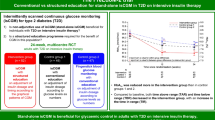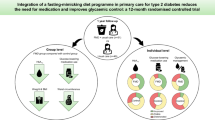Abstract
Aims
The aim of the study was to assess the efficacy of a patient education programme (DTTP) for the optimisation of conventional insulin therapy in patients with type 2 diabetes in an in- and outpatient setting.
Methods
The study was designed as a prospective, longitudinal trial. Thirty-three people with diabetes (females 54.5%, age 61.0 years, diabetes duration 12.7 years, HbA1c 9.3%) from ten general practices in Thuringia (outpatient group) participated in a DTTP for conventional insulin therapy. Thirty-three individuals—matched pairs—(female 72.7%, age 63.2 years, diabetes duration 13.6 years, HbA1c 9.7%) who were hospitalised for the optimisation of conventional insulin therapy participated in the same DTTP during their hospitalisation. All individuals were invited to participate in an outpatient follow-up visit 12 months after participation in the DTTP.
Results
All participants were re-examined after 1.0 ± 0.2 years. HbA1c improved in both groups equally by 1.2% in the outpatient group and 1.3% in the inpatient group. Insulin dosage increased marginally within the outpatient group (+ 0.09 units/kg/day, p = 0.023) and remained stable within the inpatients. Blood glucose self-monitoring increased significantly in both groups without inter-group difference (+ 7.9 vs. + 6.4 tests per week).
Conclusion
Participation in an out- or inpatient DTTP improved substantially HbA1c levels in people with type 2 diabetes on conventional insulin treatment. Probably, the improved adjustment of the eating behaviour to the insulin therapy was the reason for improved metabolic control. Guidelines should recommend “refresher” programmes when metabolic control deteriorates before an intensification of blood glucose-lowering treatment.
Similar content being viewed by others
Abbreviations
- BMI:
-
Body mass index
- DTTP:
-
Diabetes treatment and teaching programme
- HbA1c:
-
Glycated haemoglobin
References
Bundesärztekammer (BÄK), Kassenärztliche Bundesvereinigung (KBV), Arbeitsgemeinschaft der Wissenschaftlichen Medizinischen Fachgesellschaften (AWMF). Nationale VersorgungsLeitlinie Therapie des Typ-2-Diabetes – Langfassung, 1. Auflage. Version 4. 2013, zuletzt geändert: November 2014. www.dm-therapie.versorgungsleitlinien.de; [cited: 17.08.2017]; https://doi.org/10.6101/AZQ/000213
American Diabetes Association (2017) Standards of medical care in diabetes—2017. Diabetes Care 40(Suppl. 1)
Inzucchi SE, Bergenstal RM, Buse JB et al (2015) Management of hyperglycaemia in type 2 diabetes, 2015: a patient-centred approach. Update to a position statement of the American Diabetes Association and the European Association for the study of diabetes. Diabetologia 58:429–442
Assal JP, Mühlhauser I, Pernet A, Gfeller R, Jörgens V, Berger M (1985) Patient education as the basis for diabetes care in clinical practice and research. Diabetologia 28:602–613
Mühlhauser I, Bruckner I, Berger M et al (1987) Evaluation of an intensified insulin treatment and teaching program as routine management of type I (insulin-dependent) diabetes. The Bucharest–Düsseldorf Study. Diabetologia 30:681–690
Berger M, Grüßer M, Jörgens V et al (1994) Treatment and Teaching Programme for patients with type 2 diabetes with insulin therapy. Deutscher Ärzte-Verlag, Köln
The Diabetes Control and Complications Trial Research Group (1993) The effect of intensive treatment of diabetes on the development and progression of long-term complications in insulin-dependent diabetes mellitus. N Engl J Med 329:977–986
Müller UA, Müller R, Starrach A et al (1998) Should insulin therapy in type II diabetic patients be started on an out- or inpatient basis? Results of a prospective controlled trial using the same treatment and teaching programme in ambulatory care and in a University hospital. Diabetes Metab 24:251–255
Nauck MA, Haastert B, Trautner Ch, Müller UA, Nauck MA (2014) Heinemann L for the blood glucose self-monitoring clinical trials study group of the German Association for the study of diabetes. A randomized, controlled trial of self-monitoring of blood glucose in patients with type 2 diabetes receiving conventional insulin treatment. Diabetologia 57:868–877
Lipska KJ, Hirsch IB, Riddle MC (2017) Human insulin for type 2 diabetes: an effective, less-expensive option. JAMA 318(1):23–24
Quality Assurance Report (2015) Disease-Management-Programmes in North Rhine. 2016
Look AHEAD Research Group (2013) Cardiovascular effects of intensive lifestyle intervention in type 2 diabetes. N Engl J Med 369(2):145–154
Funding
The study was supported by the Ministry of Health of the state of Thuringia and Novo Nordisk. The courses for general practitioners and their assistants were supported by Boehringer Mannheim (today Roche Diagnostics Germany).
Author information
Authors and Affiliations
Corresponding author
Ethics declarations
Conflict of interest
UAM and RM received honoraria from Boehringer Mannheim, Germany for running the training courses for the general practices. All other authors declare no competing interests.
Ethical standard
The study was conducted in accordance with the ethical standards laid down in an appropriate version of the 1964 Declaration of Helsinki.
Human and animal rights
All procedures followed were in accordance with the ethical standards of the responsible committee on human experimentation (institutional and national) and with the Helsinki Declaration of 1975, as revised in 2008 (5).
Informed consent
Informed consent was obtained from all patients for being included in the study.
Additional information
Managed by Antonio Secchi.
Viktor Jörgens: Executive Director of the EASD/EFSD until 2015 (retired in February 2015) Germany.
Electronic supplementary material
Below is the link to the electronic supplementary material.
Rights and permissions
About this article
Cite this article
Kuniss, N., Müller, U.A., Kloos, C. et al. Substantial improvement in HbA1c following a treatment and teaching programme for people with type 2 diabetes on conventional insulin therapy in an in- and outpatient setting. Acta Diabetol 55, 131–137 (2018). https://doi.org/10.1007/s00592-017-1070-2
Received:
Accepted:
Published:
Issue Date:
DOI: https://doi.org/10.1007/s00592-017-1070-2




